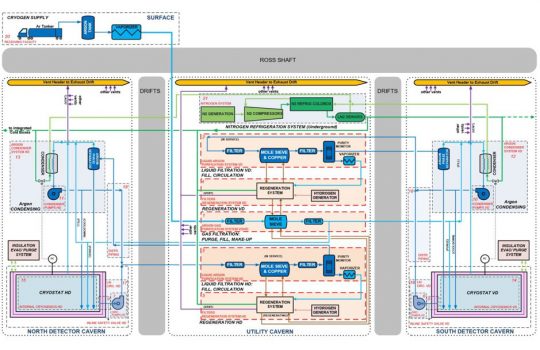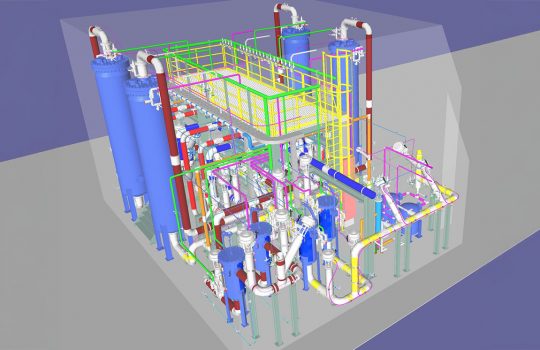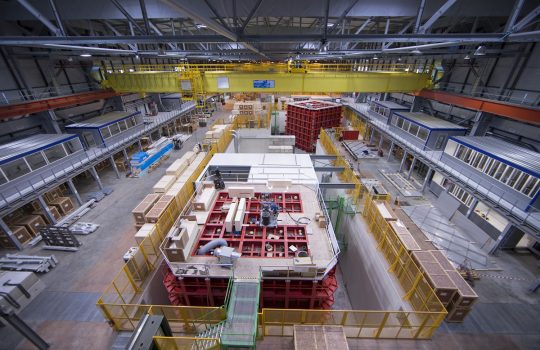On March 6, the University of Campinas in Brazil, known as UNICAMP, and the Department of Energy’s Fermilab signed an agreement to collaborate on R&D for the Long-Baseline Neutrino Facility, the infrastructure supporting the international Deep Underground Neutrino Experiment, hosted by Fermilab. On the same date, representatives from the São Paulo Research Foundation, known as FAPESP, and Fermilab signed a memorandum of understanding on scientific cooperation in high-energy physics.
“The University of Campinas is very proud of this important agreement with Fermilab, which will be a major enrichment in a long-term relationship in basic research, specifically neutrino physics. We look forward to helping build this world-class facility and addressing the significant engineering challenges it presents, and we strongly believe that together we will contribute to the advance of science and technology,” said University of Campinas Rector and Professor Marcelo Knobel.
“FAPESP values highly the collaboration with Fermilab,” said FAPESP Science Director Carlos Henrique de Brito Cruz. “This agreement will open opportunities for young researchers of any nationality to start their careers in science in universities in the state of São Paulo, Brazil, working in advanced topics related to experimental neutrino physics in the DUNE experiment.”
The Deep Underground Neutrino Experiment, known as DUNE, will study neutrinos sent from Fermilab, outside Chicago, to Lead, South Dakota, 1,300 kilometers away. There, in caverns 1.5 kilometers beneath the surface, an underground particle detector filled with 70,000 tons of liquid argon will capture the interactions of some of these neutrinos, providing scientists with hints about the evolution of our universe.

From left: FAPESP Adjunct Coordinator for Special Programs and Research Collaborations Luiz Nunes de Oliveira, Fermilab Director Nigel Lockyer, University of Campinas Rector Marcelo Knobel, Brazil Minister of Science, Technology, Innovation and Communication Marcos Pontes, U.S. Undersecretary of Commerce of Standards and Technology and NIST Director Walter Copan. Photo: Brazil Ministry of Science, Technology, Innovation and Communication
The Long-Baseline Neutrino Facility, or LBNF, will provide the cryostats housing the DUNE detector and the cryogenics to maintain the temperature of minus 184 degrees Celsius for the liquid argon inside the giant detector. The cryogenics include the nitrogen refrigeration system, pipes, pumps and other equipment needed to fill the cryostats, keep them cold, and circulate as well as purify the liquid argon.
UNICAMP researchers are contributing to LBNF/DUNE by conducting studies and tests related to recirculating, purifying, regenerating and condensing argon, including prototyping of the construction, to ensure that the necessary components meet specifications. The collaborators may also engineer, design, manufacture, test, ship and deliver systems for purifying, regenerating, circulating and condensing the argon.
“The University of Campinas continues to expand its research program with Fermilab, building on its highly successful photon detection system, called Arapuca, for DUNE. The São Paulo region brings state-of-the-art engineering talent and know-how to contribute to our challenging cryogenic designs. The FAPESP funding agency, led by Dr. Carlos Henrique de Brito Cruz, has been a wonderful partner in building our relationship with the entire Latin American science and engineering community,” said Fermilab Director Nigel Lockyer.
The memorandum of understanding promotes and deepens scientific and technological cooperation between researchers from the Brazilian state of São Paulo and Fermilab in the areas of high-energy physics, including neutrino research.
U.S. research on LBNF/DUNE is supported by the DOE Office of Science.
Fermilab is supported by the Office of Science of the U.S. Department of Energy. The Office of Science is the single largest supporter of basic research in the physical sciences in the United States and is working to address some of the most pressing challenges of our time. For more information, visit science.energy.gov.



